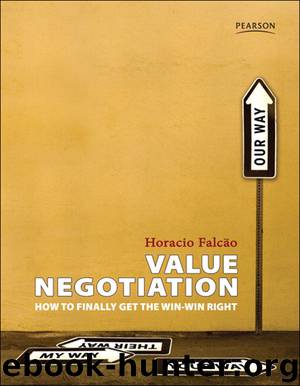Value Negotiation: How to Finally Get the Win-Win Right by Horacio Falcao

Author:Horacio Falcao [Falcao, Horacio]
Language: eng
Format: epub
Publisher: Pearson Education
Published: 2012-12-11T00:00:00+00:00
Discovering Value
Issues
For us to better understand interests, it helps to first understand issues. Issues are the topics under which the negotiators’ interests manifest themselves and they want to negotiate over. An agreement on issues is an agreement on which interests we will negotiate. Issues tend to be framed as neutral, while interests are partial. An issue normally contains at least one, if not many, interests. Some examples of issues and interests from the dialogue above:
• “I wanted to talk to you today about our partnership. “(Issue)
• “I do not want to be put in this box forever.” (Interest)
• “I am more interested in general management.”(Interest)
• “I also wanted to own a business.” (Interest)
• “Being my own boss. Controlling my time. Being part of something exciting. Sure, making money is important, but I think that the most important thing for me is that I am recognized for my value.”(Several interests)
In a negotiation, the conversation about issues is usually introduced with expressions such as: “talk about,” “discuss,” “hear your ideas on,” “cover,” “go over,” “review,” etc. Meanwhile, an interest is usually preceded by the following expressions: “I want/need/fear,” “interested in,” “very important for me,” “what I am looking for,” etc.
The number of issues in a negotiation helps in understanding its value-creation potential. Negotiations are often classified as single- or multi-issue. Normally, single-issue negotiations present fewer opportunities for value creation than multi-issue ones. It is simple mathematics: fewer issues mean on average fewer interests, and thus fewer options.
If I find myself in a single-issue negotiation, am I bound to negotiate win-lose? Bargainers accept that as a matter of fact. Indeed, it is harder to create value in single-issue negotiations, but not impossible. Thus, we reject that determinism and try to influence the negotiation towards value. Beneath a single issue, there may be several interests. One recommendation is to frame the single issue as broadly as possible to bring these other interests to the negotiation. After all, value does not come from issues, but from interests.
Issues frame the negotiation scope. If we say we want to discuss salary, we have just framed the scope too narrowly. The negotiation will more or less gravitate around money. Being close to zero-sum, little value creation is possible! However, we can frame it broader to talk about our compensation package. This will bring in different interests: apart from money, vacation days come into the picture. We may discuss a new health insurance plan or reducing travel as our family may be growing. More interests mean more possibilities of finding value for all involved.
Many negotiations are framed as single-issue due to lack of understanding or sophistication from the negotiators. Many ignore the dramatic impact that issue selection and framing have on their value creation or agreement potential. Many times we do not really know what we want. We end up framing our issues too narrowly, sometimes for the sake of being specific or efficient. However, such framing diminishes our negotiation’s value potential and drives us into an inefficient positional battle.
Download
This site does not store any files on its server. We only index and link to content provided by other sites. Please contact the content providers to delete copyright contents if any and email us, we'll remove relevant links or contents immediately.
Nudge - Improving Decisions about Health, Wealth, and Happiness by Thaler Sunstein(7690)
Deep Work by Cal Newport(7063)
Principles: Life and Work by Ray Dalio(6420)
The Doodle Revolution by Sunni Brown(4752)
Factfulness: Ten Reasons We're Wrong About the World – and Why Things Are Better Than You Think by Hans Rosling(4731)
Eat That Frog! by Brian Tracy(4525)
Thinking in Bets by Annie Duke(4218)
Hyperfocus by Chris Bailey(4110)
Visual Intelligence by Amy E. Herman(3775)
Writing Your Dissertation in Fifteen Minutes a Day by Joan Bolker(3723)
Ogilvy on Advertising by David Ogilvy(3603)
Hidden Persuasion: 33 psychological influence techniques in advertising by Marc Andrews & Matthijs van Leeuwen & Rick van Baaren(3552)
How to Win Friends and Influence People in the Digital Age by Dale Carnegie & Associates(3547)
How to win friends and influence people by Dale Carnegie(3468)
The Pixar Touch by David A. Price(3431)
Schaum's Quick Guide to Writing Great Short Stories by Margaret Lucke(3373)
Deep Work: Rules for Focused Success in a Distracted World by Cal Newport(3225)
Work Clean by Dan Charnas(3114)
The Slow Fix: Solve Problems, Work Smarter, and Live Better In a World Addicted to Speed by Carl Honore(3006)
